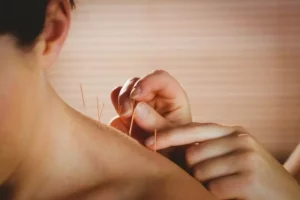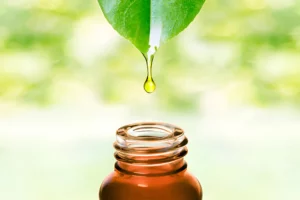Different Types of Acupuncture
In this article, we’ll explore the different types of acupuncture. This traditional Chinese medicine practice has evolved far beyond Chinese borders. Traditional acupuncture involves inserting thin needles at specific points to balance the body’s energy flow. Each type offers unique benefits, and the choice depends on individual conditions and preferences. Consulting with a trained acupuncturist can guide you towards the most appropriate type for your situation. Let’s talk more about different types to help you understand which one is better for you.
Traditional Chinese Medicine (TCM) Acupuncture
Traditional Chinese Medicine Acupuncture is a well-established practice rooted in ancient Chinese medical principles. It involves inserting fine needles at specific points on the body, known as acupoints, to balance the flow of ‘Qi’ or life energy. TCM acupuncture is often sought for various conditions, including chronic pain, stress, digestive issues, and respiratory disorders. Its holistic approach makes it suitable for those seeking a more natural and integrative form of healthcare. The practice is also popular among individuals looking to enhance overall wellness and prevent health issues. It’s important, however, to seek treatment from a licensed acupuncturist to ensure safety and effectiveness.
Japanese Acupuncture
Japanese acupuncture, a distinct style within the practice, is characterized by its gentle and precise techniques:
- Fine Needles. Japanese acupuncture, unlike Chinese acupuncture, uses thinner needles for a less invasive experience.
- Shallow Insertions. The needles are inserted more shallowly compared to other styles.
- Subtle Stimulation. It focuses on subtle stimulation of acupuncture points, making it suitable for sensitive patients.
- Emphasis on Touch. Practitioners often use palpation to diagnose and treat, enhancing the therapeutic connection.
- Holistic Approach. It considers the patient’s energy flow, or ‘Ki,’ in treatment.
Japanese acupuncture is renowned for its effectiveness in treating a wide range of conditions, from chronic pain to stress-related issues. Its gentle nature makes it a preferred choice for those who may be apprehensive about acupuncture or have sensitive constitutions.
Electroacupuncture
Electroacupuncture is a modern adaptation of traditional acupuncture, where a small electric current is passed between pairs of acupuncture needles. This method enhances the traditional practice by providing continuous stimulation to the acupuncture points. It’s particularly effective in treating chronic pain conditions like arthritis, back pain, and muscle spasms. Electroacupuncture is also used for neurological disorders and sometimes in stroke rehabilitation. Its effectiveness in pain relief can make it a suitable alternative for those who might not respond adequately to traditional acupuncture. However, it’s not recommended for people with pacemakers or other electronic devices and should always be performed by a qualified practitioner.
Scalp Acupuncture
Scalp acupuncture is a specialized form of acupuncture that involves inserting needles into specific points on the scalp. It is particularly known for treating neurological conditions and symptoms, such as stroke recovery, Parkinson’s disease, multiple sclerosis, and even post-traumatic stress disorder. This technique is thought to stimulate brain areas related to the conditions being treated. Scalp acupuncture is also used for pain management, especially for headaches and migraines. Its focus on the scalp makes it a suitable option for individuals seeking alternative treatments for neurological and neurovascular issues.
Esoteric Acupuncture
This approach emphasizes not only physical wellness but also the harmonization and equilibrium of the body’s energy points (chakras) to enhance spiritual and emotional health. People who opt for this form of acupuncture are usually in pursuit of comprehensive, holistic healing that goes beyond just addressing physical ailments. It’s ideal for individuals keen on self-development, spiritual enlightenment, and achieving emotional stability. Esoteric acupuncture is frequently applied to manage stress, anxiety, and existential dilemmas, offering a route to inner tranquility and elevated awareness.
Auricular Acupuncture
Auricular acupuncture focuses on the ear, an area believed to represent the entire body in a microsystem. It’s particularly noted for its effectiveness in addiction treatment, including smoking cessation and drug dependency, as well as for managing stress and anxiety. Auricular acupuncture is also used for pain management and chronic conditions. Its minimally invasive nature makes it suitable for patients who may be apprehensive about the more extensive needling used in other acupuncture types.
Sports Acupuncture
Sports acupuncture is a specialized form of acupuncture for athletes and individuals engaged in physical activities. It focuses on enhancing athletic performance, speeding up recovery from injuries, and preventing future injuries. Sports acupuncture practitioners often have a deep understanding of sports medicine and apply techniques that target muscle groups, joints, and nerves most affected by athletic activities. This approach is suitable for professional athletes, fitness enthusiasts, or anyone dealing with sports-related injuries and strains. It helps in managing pain, improving range of motion, and increasing strength and flexibility.
Korean Acupuncture
Korean acupuncture is yet another distinct form of acupuncture that has developed uniquely in Korea. A notable aspect of Korean acupuncture is the focus on hand acupuncture, where the hands are seen as a microcosm of the body. This method is particularly suitable for those who may be more sensitive to the deeper needle insertions of traditional acupuncture. It’s used to treat a wide range of conditions, from chronic pain to digestive issues, and is also popular for its convenience and less invasive nature. As with all acupuncture practices, it’s important to seek treatment from a certified practitioner to ensure safety and effectiveness.
Read Also: Top 10 Benefits of Acupuncture
Marina Doktorman, L.Ac. About Types of Acupuncture
Marina Doktorman, L.Ac., an experienced practitioner at an acupuncture clinic Pulse Acupuncture, offers insights into various types of acupuncture, particularly focusing on those practiced in her clinic in Brooklyn. She emphasizes the diversity and effectiveness of these methods in addressing a wide range of health concerns. Traditional Chinese acupuncture, a cornerstone of her practice, involves inserting fine needles at specific body points to balance energy flow and treat various ailments.
At her acupuncture in Brooklyn clinic, patients can experience the benefits of this ancient technique under her expert care. Chinese acupuncture, known for its holistic approach, is effective in treating pain, stress, and many other health issues, making it a popular choice for those seeking natural and comprehensive healthcare solutions. Marina’s expertise and the serene environment of her clinic provide a supportive setting for healing and well-being. Though Marina’s expertise extends far beyond traditional Chinese acupuncture and includes all the acupuncture types discussed in this article.
Read Also: What does Aromatherapy do to Help You Feel Better?
Types of Acupuncture – FAQ
How Do I Know Which Acupuncture Style is Right for Me?
Your choice may depend on personal comfort, the nature of your health concern, and practitioner recommendations. If you prefer gentler stimulation, Japanese acupuncture might be ideal. Those seeking an integrative physical, emotional, and spiritual realignment may resonate with Five-Element acupuncture. Consulting with a qualified practitioner who can explain the rationale behind their chosen technique can help guide your decision.
Is One Type of Acupuncture More Effective for Pain Relief than Others?
Effectiveness often depends on the individual’s condition and response. TCM acupuncture is widely researched for pain management and has a long track record. Auricular acupuncture is frequently used to treat addiction-related discomfort or localized pain, while trigger-point (or dry needling, an acupuncture-adjacent technique) can be particularly effective for muscular tension and sports injuries. Your practitioner can recommend the most suitable approach based on clinical experience and your personal health profile.
Can I Combine Different Acupuncture Styles in one Treatment Plan?
Yes, many experienced acupuncturists blend elements from various traditions to create a tailored, patient-centric treatment. For example, they may combine TCM body needling for systemic balance with auricular acupuncture to reinforce stress reduction or pain control. This integrative approach can enhance results, provided the practitioner is qualified and experienced in multiple methodologies.
How Do I Find a Qualified Practitioner for a Specific Acupuncture Style?
Look for practitioners who are licensed, nationally certified, or hold recognized credentials in acupuncture. Professional organizations and regulatory boards often list certified practitioners by specialty. Ask about their training, experience, and areas of expertise. Many will offer consultations to discuss your goals and help determine if their approach aligns with your needs.
-
Marina Doktorman, M.S., L.Ac., is an experienced acupuncturist who obtained her Masters of Acupuncture from the Tri-State College of Acupuncture in New York City in 2001. During her studies, she focused on Chinese Herbology, a branch of Traditional Chinese Medicine (TCM) that utilizes herbs to complement acupuncture treatments. Marina is licensed in both New York (NY) and New Jersey (NJ) and holds a Diplomate of Acupuncture from the National Certification Commission for Acupuncture and Oriental Medicine (NCCAOM), indicating her expertise in the field.







